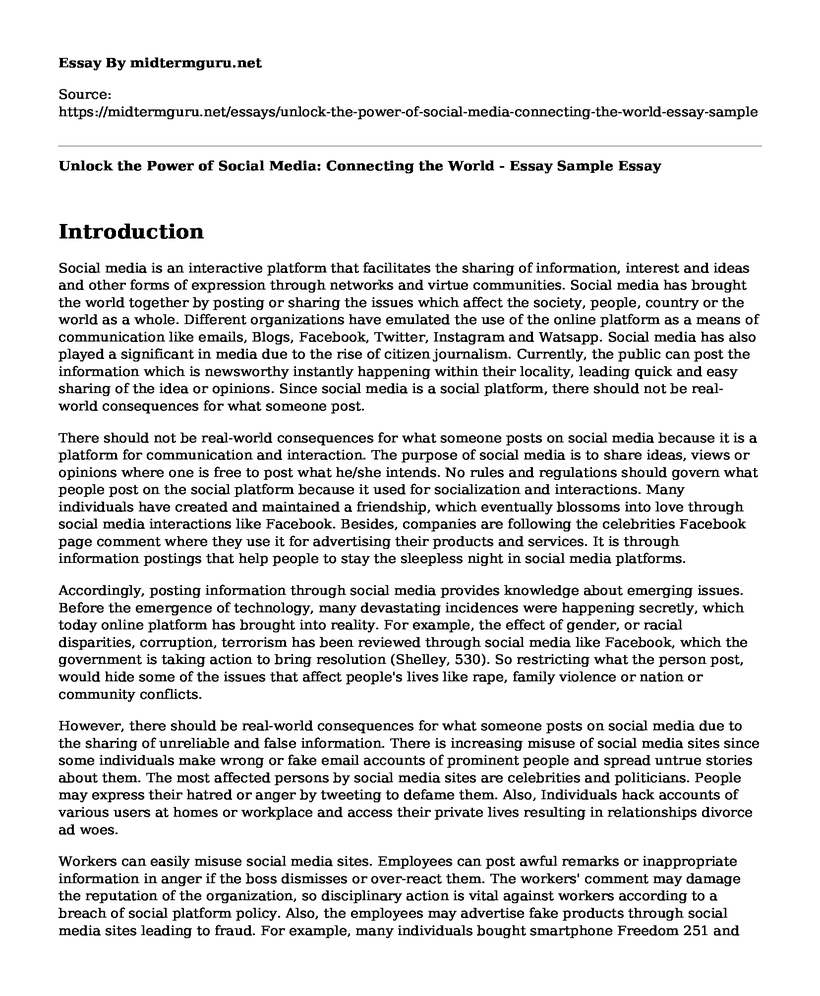Introduction
Social media is an interactive platform that facilitates the sharing of information, interest and ideas and other forms of expression through networks and virtue communities. Social media has brought the world together by posting or sharing the issues which affect the society, people, country or the world as a whole. Different organizations have emulated the use of the online platform as a means of communication like emails, Blogs, Facebook, Twitter, Instagram and Watsapp. Social media has also played a significant in media due to the rise of citizen journalism. Currently, the public can post the information which is newsworthy instantly happening within their locality, leading quick and easy sharing of the idea or opinions. Since social media is a social platform, there should not be real-world consequences for what someone post.
There should not be real-world consequences for what someone posts on social media because it is a platform for communication and interaction. The purpose of social media is to share ideas, views or opinions where one is free to post what he/she intends. No rules and regulations should govern what people post on the social platform because it used for socialization and interactions. Many individuals have created and maintained a friendship, which eventually blossoms into love through social media interactions like Facebook. Besides, companies are following the celebrities Facebook page comment where they use it for advertising their products and services. It is through information postings that help people to stay the sleepless night in social media platforms.
Accordingly, posting information through social media provides knowledge about emerging issues. Before the emergence of technology, many devastating incidences were happening secretly, which today online platform has brought into reality. For example, the effect of gender, or racial disparities, corruption, terrorism has been reviewed through social media like Facebook, which the government is taking action to bring resolution (Shelley, 530). So restricting what the person post, would hide some of the issues that affect people's lives like rape, family violence or nation or community conflicts.
However, there should be real-world consequences for what someone posts on social media due to the sharing of unreliable and false information. There is increasing misuse of social media sites since some individuals make wrong or fake email accounts of prominent people and spread untrue stories about them. The most affected persons by social media sites are celebrities and politicians. People may express their hatred or anger by tweeting to defame them. Also, Individuals hack accounts of various users at homes or workplace and access their private lives resulting in relationships divorce ad woes.
Workers can easily misuse social media sites. Employees can post awful remarks or inappropriate information in anger if the boss dismisses or over-react them. The workers' comment may damage the reputation of the organization, so disciplinary action is vital against workers according to a breach of social platform policy. Also, the employees may advertise fake products through social media sites leading to fraud. For example, many individuals bought smartphone Freedom 251 and later discovered that the organization does not exist (Bharati, Zhang, and Chaudhury, 466).
Conclusion
There should have no consequences of what someone posts through social media sites because it is a platform which connects individuals regardless of the background or geographical boundaries. Sites like Twitter and Facebook have created online societies where individuals can share their opinions or ideas as they wish. Initially, people used the social platform to learn about their nations and maintain relationships, and today, it is used as a medium of communication or sharing information. However, the word should take action against the people who misuse social media by sharing unreliable and false information, fraud and defamation acts. Hence, there should not be a real-world consequence for what someone post.
Works Cited
Bharati, Pratyush, Wei Zhang, and Abhijit Chaudhury. "Better Knowledge with Social Media? Exploring the Roles of Social Capital and Organizational Knowledge Management." Journal of Knowledge Management 19.3 (2015): 456-475.
Boulianne, Shelley. "Social Media Use and Participation: A Meta-Analysis of Current Research." Information, Communication & Society 18.5 (2015): 524-538.
Cite this page
Unlock the Power of Social Media: Connecting the World - Essay Sample. (2023, Feb 04). Retrieved from https://midtermguru.com/essays/unlock-the-power-of-social-media-connecting-the-world-essay-sample
If you are the original author of this essay and no longer wish to have it published on the midtermguru.com website, please click below to request its removal:
- Feminist Blog Review Paper Sample
- The Visual Content On Instagram: How Imagery Is Being Experienced by the Target Group of Emma Matratzen
- Paper Example: What Is Theatre Review?
- Essay Sample on Importance of Feedback
- Rebooted Planet of the Apes Series - Film Analysis Essay
- Romanticism in Art: Expressing Emotions Through Colors - Essay Sample
- Redefining Society: The Necessity for Change - Essay Sample







